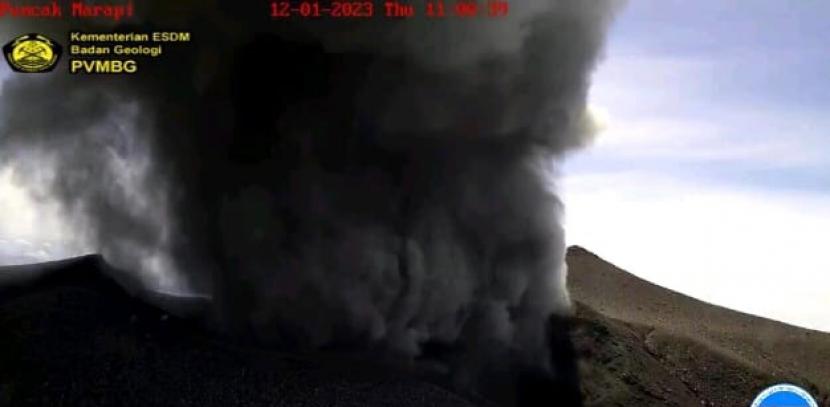REPUBLIKA.CO.ID, JAKARTA - Gunung Marapi which is located in the administrative area of Agam and Tanah Datar Regency, West Sumatra, erupted on Sunday (3/12/2023) at around 2:54pm. The eruption of this 2,891 meters ASL volcano is characterized by the spewing of ash columns filled with volcanic material up to 3,000 meters from the top of the crater, accompanied by a rumbling sound.
According to the seismogram recording results of the Center for Volcanology and Geological Disaster Mitigation (PVMBG), the eruption of Mount Marapi was recorded with a maximum amplitude of 30 mm and a duration of 4 minutes 41 seconds.
The eruption of Mount Marapi was also confirmed by the Head of the Regional Disaster Management Agency (BPBD) of Agam Regency, Bambang Wasito in a telephone call. “Right. The conditions of Mount Marapi erupting. The ash column rises high up visible from Agam,” Bambang said in a press release from the National Agency for Disaster Management (BNPB), Sunday (3/12/2023).
Currently, the Agam Regency BPBD team is located in the two areas closest to the summit, namely Sungai Pua District and Canduang District. “Currently, I am with the Agam Regency BPBD team skating to two areas of the nearest subdistrict from the summit. Our Pusdalops team is already in those two locations,” Bambang said.
Contacted separately, the team of the Control and Operations Center (Pusdalops) of BPBD Agam Regency, Ade Setiawan, said that volcanic ash rain from the eruption of Mount Marapi was reported in the area of Nagari Lasi, Canduang District, Agam Regency, West Sumatra, Sunday (3/12/2023).
Reporting directly from the field by the team of the Control and Operations Center (Pusdalops) of the Regional Disaster Management Agency (BPBD) of Agam Regency, the volcanic ash rain fell with high intensity until the atmosphere of Nagari Lasi became very dense and dark. “The ash rain was quite intense and dark occurred in Nagari Lasi, Canduang. Now it has stopped,” Ade said.
Upon arrival at the site, Agam Regency BPBD team together with PMI immediately distributed masks to the community. In addition, they also appealed to people not to leave their homes first given the high intensity of volcanic ash rain and can have an impact on health. “People have been handed masks and reminded to stay indoors,” Ade said.
Ade Setiawan said they also appealed to people not to leave their homes first given the high intensity of volcanic ash rain and can have an impact on health. “People have been handed masks and reminded to stay indoors,” Ade said.
In the statement BNPB said the eruption of Mount Marapi resulted in volcanic ash rains that fell with high intensity to make Nagari Lasi's atmosphere very dense and dark. “The ash rain was quite intense and dark occurred in Nagari Lasi, Canduang. Now it has stopped,” Ade said.
The statement also mentioned that the Center for Volcanology and Geological Disaster Mitigation (PVMBG) noted the symptoms of increased volcanic activity of Mount Marapi that could cause explosive eruptions already in place since January 2023. Since then, Marapi has been in a status at level II or Alert level because it can erupt at any time.
The PVMBG noted since then there has also been only a slight increase in pressure recorded in the tool near the top/below the crater. Based on the results of a thorough analysis and evaluation until November 16, 2023, the activity level of Gunungapi Marapi is still at Level II with recommendations adjusted to the potential threat of current hazards.
Regarding the level of activity of Mount Marapi at Level II (Alert), BNPB requests that people around Mount Marapi and visitors/tourists do not conduct activities within a 3 km radius of the crater/summit. BNPB also asked that the communities around Mount Marapi not be alarmed by issues about the eruption. The agency asked people to always follow directions from the Local Government.
“In the event of ash rain, people are encouraged to wear masks when leaving the house to reduce the impact of volcanic ash on health. Securing clean water means as well as cleaning the roofs of houses from thick volcanic ash so as not to collapse,” BNPB said in its statement.


